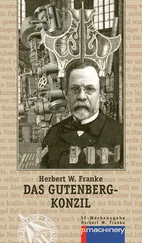Alix Christie
Gutenberg's Apprentice
In memoriam
Lester Lloyd
James Robertson
Master printers
For there is nothing hid, which shall not be made manifest: neither was it made secret, but that it may come abroad.
— THE GOSPEL ACCORDING TO MARK, 4:21
In the annals of innovation, new ideas are only part of the equation. Execution is just as important.
— WALTER ISAACSON, Steve Jobs: A Biography
September 1485
MANY YEARS AFTERWARD, when Abbot Trithemius first asked him to recall the true beginnings of the glorious art of printing, Peter Schoeffer refused. The story was too private, he informed the abbot, and not really his.
“Exactly so. No man invents alone! Creation is the Lord’s own province.” The monk, with a wide smile, was pitching toward his guest. “It follows that the man who made this miracle was touched by God.”
He’s young — too young to be the abbot of this hilltop cloister, master of a vaulted study lined with books whose brass clasps shimmer in the golden autumn light. Nor does Peter Schoeffer like the glint of satisfaction in his eyes. Although he knows why it is there: Trithemius has netted him at last, has drawn the celebrated printer up to his own abbey after many tries.
“I plan to write it all,” the abbot says, and lifts an arm to circumscribe the library, the thick stone keep, the Rhineland down below. “A chronicle of all that has transpired here in this blessed time. None of more import, surely, than this great invention in which you, sir, played a part.”
He uses me to make his reputation, Peter thinks. Is this how chronicles are made, the story told to those who’d make their name by those whom time and fate have unaccountably left standing?
On his way into the abbey he and the abbot wove through courtyards past the chapel, to the open cloister walk where even now the monks sit writing, backs bent, desks positioned to receive the slanting harvest sun. How long it’s been, Peter remarked, surprised, since he has seen a group of Benedictine brothers in such busy, scratching rows. Once every cloister of the great monastic orders had scriptoria where God’s Word flowed from hand to parchment, but hardly any now survive.
The abbot did not even break his stride. “They curse me for it,” he said with a tight smile, “and protest that the printing press should spare them this hard drudgery.”
Peter has brought books from his own press to give to Sponheim, mainly standard works of liturgy and law. His thoughts have started turning to the prayers the monks will say in thanks when his soul nears its time. Trithemius receives these printed volumes greedily, though his own shelves are filled with handwork of the scribes. He strokes their leather bindings, and fixes Peter once again with his light, intense eyes.
“You are the only one who knows the truth, now that both Johanns have been called home to God.”
Johann Gutenberg, he means, and Johann Fust.
Peter Schoeffer’s mind is clear, his fingers as strong as they have ever been. He’s over sixty now, a father to four sons, and the wealthy founder of the greatest printing house in all of Germany. A lean, tall man, he wears a close-cropped silver beard on his narrow, sober face.
“The truth.” He smiles.
Much has been said in the decades since, but almost none of it is true. They’ve practically canonized the man who found this wondrous art. How Gutenberg would laugh if he could see them from above… or else below. The final disposition of the master’s soul is far from certain.
“They say he died in penury, abandoned and betrayed.” The abbot’s voice turns hard.
Well Peter Schoeffer knows the charge: that it was he and Fust, his foster father, who wrenched the Bible workshop from the master and robbed him of his whole life’s work. For years he’s borne the slander of this heinous accusation.
“It is a lie.” His voice is clipped. “He died a member of Archbishop Adolf’s court, highly praised and well attended.”
“While your own firm went on and prospered.”
“Success, dear brother, is no crime.” He gives the monk a piercing look. “Betrayals there were, certainly — but not how people think.”
“Then there’s a tale to tell, indeed.”
The abbot moves toward the window, where he stays a moment lost in — or feigning — thought. His plain black habit hangs on his large frame like fabric on a birdcage.
“We have a duty, don’t you think?” Trithemius looks back. “A duty to the past, and to the future?”
Though more than thirty years have passed, Peter is loath to blacken the master’s name. Deep down, he still must love the madman, Gutenberg, that burning, brutal genius who tore down as much as he created — who took the credit, always, regardless of whether it was due. He conceived the craft and forged the metal letters before anybody else, this none could reasonably deny. But without Peter and his father, that great Bible would never have been made.
“Think of the ark of history.” The abbot tries a different tack. “Does not the great vault of historia contain all past and present and the whole created world? Is not each word, each action that we take, therefore a part, however small, of the vast architecture of God’s plan?”
Trithemius has a domed forehead and unblinking eyes. He’s confident, wellborn, without a doubt — and the same age that Peter was when it began, with that same burning drive. Peter searches in the corners of the memory palace in his mind. God’s vault is vaster, and by far: he’s always pictured it a nave that fills the sky.
He once believed that what they did would lift them higher, ever higher — he sensed the godliness that flows throughout Creation brush them. Until it cracked, and their whole workshop filled with anger and recriminations. With each succeeding year Peter has seen the world become unhinged, cacophonous, the very earth stunned by the pounding of machines. And he’s begun to wonder if God did not unleash some darker force with that great shining net of words.
He’s never wanted to expose the master, not out loud. He’s prayed for years to find forgiveness in his heart. But deep inside he still blames Gutenberg for how it all came crashing down. He scratches at his beard. Trithemius is right. Posterity should know the truth; the world should know the role he and Fust played.
The abbot sits and reaches for a reed.
A tool — that’s how the master saw him at the end. Yet which among them is not the Master Craftsman’s tool? Peter feels a sudden lightness, like a bubble rising through a molten mass. He’ll tell it as he can. With modesty, he prays: God knows he’s struggled all his life against the sin of pride.
“It may take many visits,” he says, rising in his turn and looking out on the fading orchard, the mottled auburn hills that step down to the valley far below.
Who can say if what they made will prove a force for good or ill? God alone can know. To pretend otherwise is to presume to know His mind. Yet isn’t that just what they did in those few heady years, inflamed by ardor, hubris, youth? Imagined that the three of them with their own newfound art could rise as high?
“ Historia .” He nods. “All right. Perhaps you’ll find a way, where I have not, to spy the meaning that the Lord inscribed.”
CHAPTER 1: MAINZ, GERMANY
September 1450
IWAS TWENTY-FIVE the year my father called me home.” So it began. The letter was delivered to the workshop on the rue des Écrivains, where he sat copying some proofs of Aristotle. It did not state the reason why. His father just reached out his merchant’s hand and plucked Peter up, as if he were a number to be transferred from one column to the other in his fat brown ledger. From Paris, back to Mainz: Peter felt the sting of it the whole three days it took to cross the flat French plain and sweep home down the Rhine.
Читать дальше












